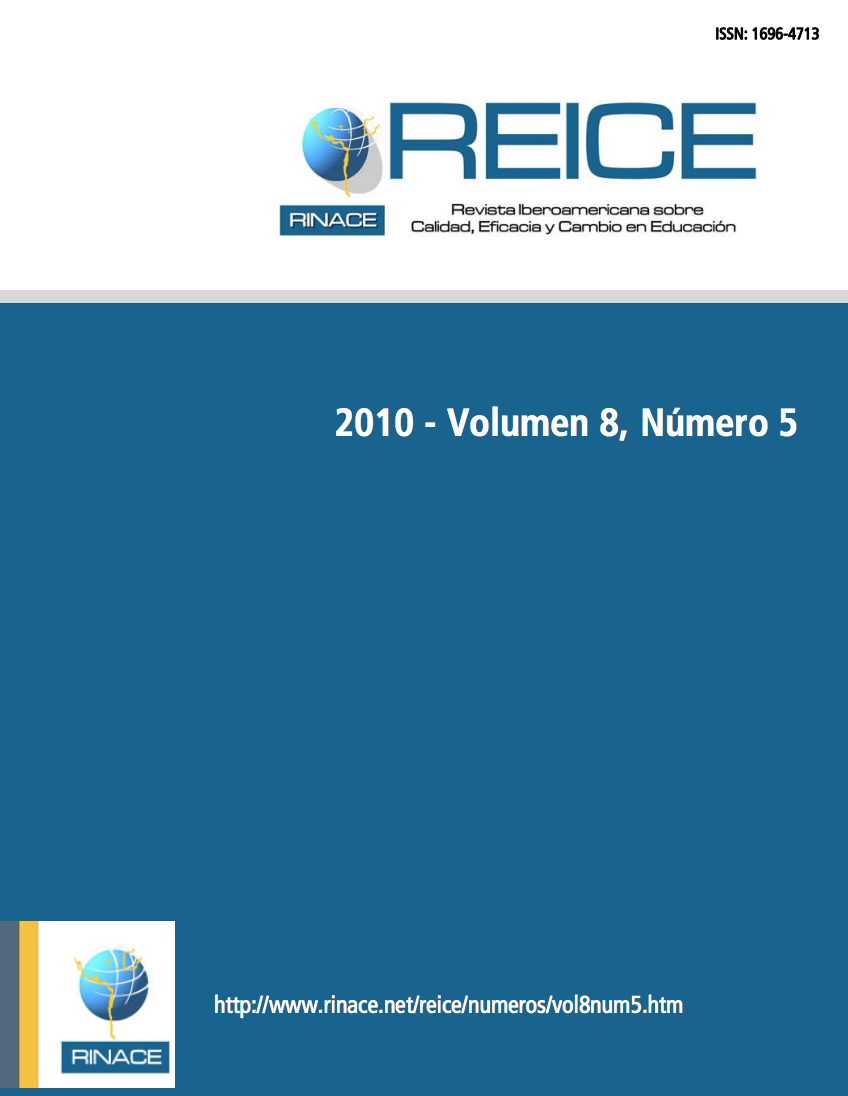Keywords:
School effectiveness, school improvement, school managementCopyright (c) 2023 REICE. Revista Iberoamericana sobre Calidad, Eficacia y Cambio en Educación

This work is licensed under a Creative Commons Attribution-NonCommercial-NoDerivatives 4.0 International License.
Abstract
This article presents a study case of an improvement process at a Venezuelan school. Intended to identify and describe the policies and measures placed in practice and to analyze the effects and consequences of the mentioned while looking to identify the existing relation between the policies, the measures and the changes perceived by the teaching community.
Downloads
References
Barbour, R. (2008). Introducing Qualitative Research (First ed.). London: SAGE.
Bassey, M. (1999). Case study research in educational setting. Maidenhead, Open University Press.
Beare, H. (2007). Four decades of body-surfing the breakers of school reform: just waving, not drowning. In T. Townsend (Ed.), International Handbook of School Effectiveness and Improvement , 1, pp. 27-40. Dordrecht, Springer.
Borg, W.R. y Gall, M.D. (1989). Educational research, an introduction (5th Ed.). New York–London, Longman.
CINTERPLAN, UCAB y CICE. (1995). Gestión de Escuelas Venezolanas (Unpublished), pp. 151. Caracas, CINTERPLAN-UCAB-CICE.
Coleman, M. y Briggs, A.R.J. (2002). Research Methods in Educational Leadership and Management (2006 Ed.). London, SAGE.
Creemers, B.P.M. y Kyriakides, L. (2008). The Dynamics of Educational Effectiveness: A Contribution to Policy, Practice and Theory in Contemporary Schools. London, Routledge.
Creemers, B.P.M., Stoll, L. y Reezigt, G.J. (2007). Effective School Improvement-Ingredients for Success: The Results of an International Comparative Study of Best Practice Case Studies. In T. Townsend (Ed.), International Handbook of School Effectiveness and Improvement, 2, pp. 825-838. Dordrecht, Springer.
Chen, P. (2008). Strategic leadership and school reform in Taiwan. School Effectiveness and School Improvement, 19(3), pp. 293-318.
Danielson, C. (1996). Enhancing Professional Practice, A Framework for Teaching. Alexandria, ASCD.
Davis, G.A. y Thomas, M.A. (1992). Escuelas Eficaces y Profesores Eficientes. Madrid, La Muralla.
Day, C., Leithwood, K. y Sammons, P. (2008). What we have learned, what we need to know more about. School Leadership & Management, 28(1), pp.83-96.
Denscombe, M. (2007). The Good Research Guide. New York, Open University Press.
Earl, L. y Fullan, M. (2003). Using Data in Leadership for Learning. Cambridge Journal of Education, 33(3), pp. 383-394.
Fullan, M.G. (1992). Successful School Improvement. Buckingham-Philadelphia, Open University Press.
Gu, Q., Sammons, P. y Mehta, P. (2008). Leadership characteristics and practices in schools with different effectiveness and improvement profiles. School Leadership & Management, 28(1), pp. 43-63.
Harris, A. (2001). Contemporary Perspectives on Effectiveness School Improvement. In A. Harris & N. Bennett (Eds.), School Effectiveness and School Improvement (2005 Ed.). London-New York, Continuum.
Harris, A. y Muijs, D. ( 2005). Improving Schools Through Teacher Leadership. Maidenhead, Open University Press.
Herrera, M. y Lopez, M. (2005). Fortalecimiento de la gestión escolar de las escuelas municipales de Chacao. Memoria Descriptiva. (Unpublished), pp. 60. Caracas, CICE.
Herrera, M. y López, M. (1996). La Eficacia Escolar. Caracas, CINTERPLAN.
Hopkins, D. (2001). School Improvement for Real. London, Routledge Falmer.
Keats, D.M. (2000). Interviewing. A practical guide for students and professionals. Buckingham, Open University Press.
Leithwood, K. y Day, C. (2008). The impact of school leadership on pupils outcomes. School Leadership & Management, 28(1), pp. 1-4.
Leithwood, K., Harris, A. y Hopkins, D. (2008). Seven strong claims about successful school leadership. School Leadership & Management, 28(1), pp. 27-42.
Lopez, M. (2003). Los estudios sobre escuelas eficaces en Venezuela. In F. J. Murillo (Ed.), La Investigación sobre Eficacia Escolar en Iberoamérica, pp. 16. Bogotá, Convenio Andrés Bello.
Macbeath, J. y Mortimore, P. (2001). School effectiveness and improvement: the story so far. In J. Macbeath & P. Mortimore (Eds.), Improving School Effectiveness (2001 Ed.). Maidenhead-Philadelphia, Open University Press.
Macbeath, J. y Stoll, L. (2001). A profile of change. In P. M. John Macbeath (Ed.), Improving School Effectiveness,pp. 152-168. Maidenhead, Open University Press.
Marzano, R.J. (2007). Leadership and School Reform Factors. In T. Townsend (Ed.), International Handbook of School Effectiveness and Improvement, 2, pp. 597-614. Dordrecht, Springer.
Mason, J. (2002). Qualitative Researching. London, SAGE.
Murillo, F.J. (2007). School effectiveness research in Latin America. In T. Townsend (Ed.), International Handbook of School Effectiveness and Improvement, 1, pp. 75-92. Dordrecht, Springer.
O'Donoghue, T. (2007). Planning your qualitative research project: an introduction to interpretivist research in education.London, Routledge.
Opie, C. (2004a). What is Educational Research. In C. Opie (Ed.), Doing Educational Research, pp. 1-14. London, SAGE.
Opie, C. (Ed.). (2004b). Doing Educational Research. London, SAGE.
Penlington, C., Kington, A. y Day, C. (2008). Leadership in improving schools: a qualitative perspective. School Leadership & Management, 28(1), pp. 65-82.
Reed, J. y Lodge, C. (2006). Towards Learning-Focused School Improvement. Research Matters, 28(11).
Reynolds, D., Creemers, B., Stringfield, S., Teddlie, C. y Schaffer, G. (Eds.). (2002). World Class Schools. London.
Rubin, H.J. y Rubin, I.S. (2005). Qualitative Interviewing. The Art of Hearing Data (Second Ed.). London, SAGE.
Sammons, P., Hillman, J. y Mortimore, P. (1997). Key characteristics of effective schools: a review of school effectiveness research. In J. White & M. Barber (Eds.), Perspectives on School Effectiveness and Improvement, pp. 77-124. London, Institute of Education.
Stoll, L. y Mortimore, P. (1997). School Effectiveness and School Improvement. In J. White & M. Barber (Eds.), Perspectives on School Effectiveness and School Improvement, pp. 210. London, Institute of Education.
Stoll, L. y Sammons, P. (2007). Growing Together: School Effectiveness and School Improvement in the UK. In T. Townsend (Ed.), International Handbook of School Effectiveness and Improvement, 1, pp. 207-222. Dordrecht, Springer.
Wetherill, K.S. y Applefield, J.M. (2005). Using School Change States to Analyze Comprehensive School Reform Projects. School Effectiveness and School Improvement, 16(2), pp. 197-215.
Wragg, T. (2002). Interviewing. In M. Coleman & A. R. J. Briggs (Eds.), Research Methods in Educational Leadership and Management, pp. 143-158. London, SAGE
